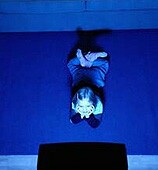
TUESDAY, March 26 (HealthDay News) — Five-year-olds who watch television for three or more hours a day are a bit more likely to fight, steal and have other antisocial behaviors by the age of 7, a new study suggests.
The researchers also found that time spent playing computer or electronic games had no effect on children’s behavior, according to the report published online March 25 in the Archives of Disease in Childhood.
For the study, the investigators analyzed data gathered from about 11,000 children in the United Kingdom who were born between 2000 and 2002. When the children were ages 5 and 7, their mothers filled out a questionnaire designed to assess how well-adjusted the children were, and also provided information about the amount of time their children spent at age 5 watching TV and playing computer or electronic games.
At age 5, nearly two-thirds of the children watched TV for between one and three hours a day, 15 percent watched TV for more than three hours a day, and less than 2 percent watched no TV. Only 3 percent of the kids spent three or more hours a day playing computer or electronic games when they were 5 years old, the study authors reported.
After taking into account other factors, such as parenting and family dynamics, the researchers concluded that there was a significant association between watching TV for three or more hours a day at age 5 and a “very small” increased risk of antisocial behavior by age 7.
But watching a lot of TV was not associated with emotional or attention problems, the authors noted in a journal news release.
These findings — and previous studies showing that too much screen time can have a harmful effect on youngsters’ physical health and schooling — suggest that parents are right in limiting TV time for their children, concluded study author Alison Parkes, of the University of Glasgow in Scotland, and colleagues.
The study found an association between increased TV watching at age 5 and a small increased risk of antisocial behavior at age 7, but it didn’t find a cause-and-effect relationship.
More information
The U.S. National Library of Medicine has more about children and screen time.

